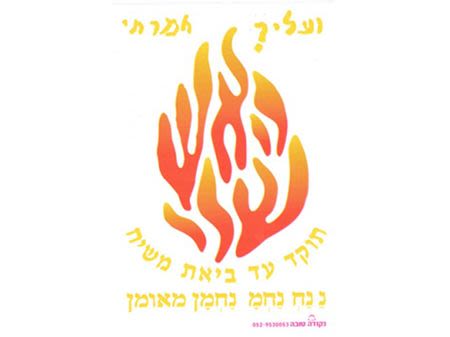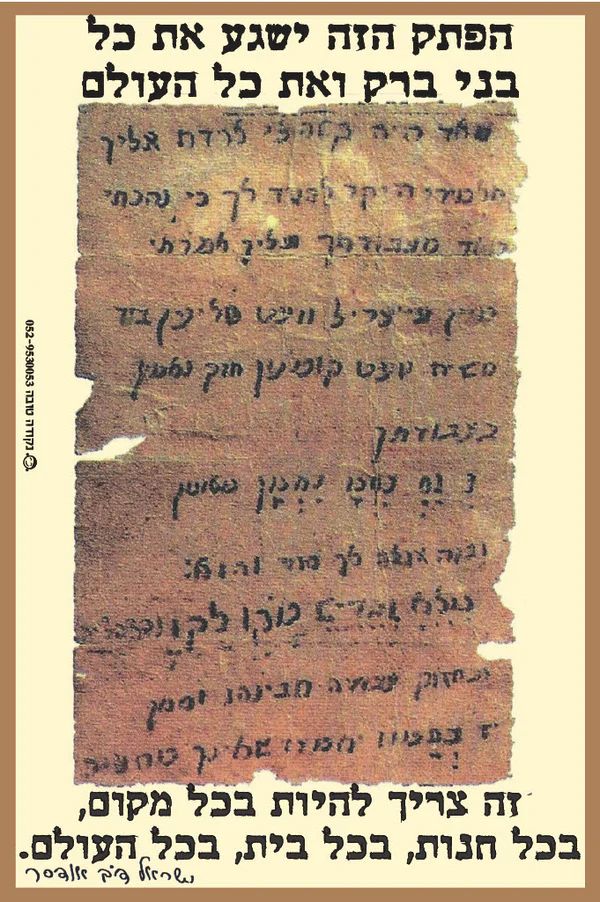
Reflections of the War
Everyone is on super-alert here; anything that remotely resembles a whistle is enough to make one stop and flinch. Will there be another crash of a landing missile?

At the time of this writing, the third week of the war is almost over and those of us still here in town must come to terms with the grim reality of living life in its shadow. Not a day goes by without us remembering that we live in the firing line, because not a day goes by without us being sent a reminder – or six.
On average we have two missile attacks a day with anything up to six missiles at a time; every so often we are fortunate and we "only" have one attack on a particular day, but this is usually made up during the following days when we'll have more than the daily average.
The days that we do have more than two attacks is considered a "difficult" day, the reason being that although externally one acts calmly, internally it takes a few hours to calm down after an attack; if one is attacked every few hours there is not enough time to calm down in between (which leads to an overload).
I suppose we should be grateful that we do not have the terror of death actually raining down on us continuously from the skies. It's enough to have the threat of it hanging over your head all the time. Because there is no set time for missile attacks one's nerves are on edge all day (and night). Sending missiles at different times of the day is a tactic of the terrorists so that we should live in constant fear and uncertainty – and unfortunately it works.
Much of Ashdod has been a ghost town almost since the war started, and one has hardly seen a single person on the streets. It's been so quiet that sometimes I've felt as if I was the only person around – and the silence, well that's been deafening.
It's amazing what a person can learn to live with: even with all the danger hovering over us we seem to have settled into a routine and "acclimatized" to the new reality. We go about our daily lives exactly as we did before, but obviously with a few changes.
Firstly, the "secure room" (built in every flat in the newer apartment blocks) is always ready for immediate use, as are all the communal air-raid shelters in the older buildings. (A secure room is a room built with extremely thick, solid concrete walls which is supposedly able to withstand a missile attack). In fact, in some of the flats with a secure room the whole family sleeps there as the children are too frightened to sleep anywhere else.
We only go out when necessary to stock up on food or other vital necessities, but whereas in the past the shops were always crowded with children shopping for their mothers, all you see now is a few adults.
Of the local shops only those selling basic necessities are open; the grocer is open every day, the green-grocer is open every second day, and the meat and fish shops are open towards the end of the week. All the other shops are closed because the owners say no-one ventures out to buy anything.
At home we are all stocked up with bread and milk and other staples in case of supplies not being able to get through to the shops.
The children have all been taught what to do when they hear the sirens: to run immediately to the secure room in their flat (if they have one) or to run down to the communal air-raid shelter so that their mother only has to "worry" about getting the baby and/or toddler to safety.
When a two and a half year old was asked what she does when she hears the sirens she answered "I run into the secure room straightaway"; and when she was asked what she does there, she simply said "I cry".
Children have begun to go down to the gardens of their apartment buildings to play but they are always accompanied by an adult, and they only play near the entrance of the building. The parks and communal play areas are still empty because they are too far away from a safe place.
Everyone is on super-alert here; anything that remotely resembles a whistle is enough to make one stop whatever one is doing and analyze what that sound is, and one flinches at any thud that resembles the bang of a landing missile.
As for me, when I hear the sirens starting up I quickly finish whatever I'm doing (after all I know I've got fifteen seconds till the sirens stop and that's really a long time). As the sirens die away I run into the inner-most room in our flat and count forty five seconds by the clock ticking on the wall. The ticking clock is very loud because all is deadly silent as everyone waits tensely to hear where the missile will fall.
Once I've heard the bang – or three – depending on how many missiles have fallen, I wait another thirty seconds just to make sure that it's all over, and then I just carry on with whatever I was doing when I was interrupted. It does though, as I said before, take time nowadays to calm down internally after an attack because how many times can the nervous system be raised to "fight or flight" pitch?
The closer the missiles fall, the more one needs to strengthen oneself in emunah and bitochon. This past Sunday was a real test because a missile fell four hundred meters from our apartment block (that's about two streets away!) and boy did we hear and feel it! We felt the thump and crunch as it buried itself into the ground and the whole building shook in the aftermath of the blast. You can imagine our tension as we waited to see if any more missiles would fall but Boruch Hashem nothing more fell then (so far we've never had more than three missiles fall within hearing range at one time).
Boruch Hashem there was no damage to people or property (as "usual") although the missile fell on a small patch of ground between a shul and a kindergarten!
I was due to go to Bene Brak just then but I waited awhile as we have been known to have "cluster" attacks i.e. two attacks close together, and only when I was sure that nothing further was coming did I leave.
What can I tell you – when I arrived in Bene Brak I felt as if I had landed on a different planet. What a difference between "them" in Bene Brak and "us" in Ashdod! The streets were teeming with seemingly unconcerned people, and the city was alive and bustling (bursting at the seams I hear with all the Ashdodians who have fled there); best of all everybody seemed relaxed and natural.
And although I've got used to Ashdod as a ghost town, and in a sense it has even become "normal", visiting Bene Brak brought home to me what an unnatural, tense life we do actually lead here.
Many people have asked me why I'm still here in the firing line and the Rov himself, whilst he has no intention of leaving, has told me that if I want to I can go and stay in Bene Brak. And in truth, when the "going has gotten tough", I have been tempted once or twice to leave and wait it out in the peace and "quiet" of Bene Brak.
There is no shame in leaving a dangerous place when you feel you are unable to remain there. There is a saying of our sages, "Always be as soft as a reed and not as hard as a cedar tree".
What this means is that reeds which grow at the edge of a river are soft and pliable so that when storm winds blow they sway and bend in the winds. When the storm passes they right themselves and stand tall once again. On the other hand the cedar tree is an extremely strong and rigid tree which cannot bend, so that when storm winds blow it breaks, topples over and dies.
In the same manner we Yidden are told to behave like the reeds; we know that there are times when we must "bow and bend" when troubles overtake us. Rather than staying (standing strong like the cedar tree) and risking death in an unsafe place, it is better to protect ourselves by lying low or running away in order to survive until the "storm" passes. We must never lose sight of the fact that our most important duty as Yidden is our continued existence as a nation, and it is this ability, to "bend low", that has enabled us to survive throughout the centuries and rise again, to carry on living as Am Yisroel.
The reason why I am still staying here, and relatively calmly too, has nothing to do with this issue though.
We do not have access or listen to the radio and certainly not the television, but we are nevertheless able to keep ourselves updated on the war. There is a phone number which we can call where we can hear shiurim and other items of interest to frum Yidden, amongst them the latest news. This facility has been available for a long time, but I have never really made use of it; now however, it is very convenient when I want an update on the war. Boruch Hashem the news is presented from a frum perspective so I can be certain that I won't hear things that I shouldn't hear.
Amongst the things we hear is a constant update as to where missiles have fallen and the damage that they have caused. If we've had an attack here in Ashdod, we know that within fifteen minutes we'll be able to find out exactly what happened, although where the missiles fell is not broadcast as that's classified information.
And out of all the news being broadcast what do you think is the most constant refrain we hear in the newscaster's updates?
It is the following sentence: "In xyz city two (to six) missiles have fallen. They fell in open fields and with Heavenly compassion there are no wounded and (usually) no damage to property"!
This one sentence is so invariable that it has become an integral part of each news update, so much so that it is a "routine" part of the broadcast – "the way it's supposed to be" you could almost say. I have even been told by children on more than one occasion that they couldn't understand why the adults were so frightened by those missiles as they didn't really do anything. The first time I heard this I was struck dumb at the child's naiveté, but decided in the end not to frighten him by telling him what a missile is actually capable of doing.
We have heard that so far the terrorists have shot 550! missiles at the south of Eretz Yisroel in the last two and a half weeks alone (and 10,000! missiles in the past eight years), so before we continue let's paint a real-life scenario of what those missiles can actually do.
The terrorists have been using two types of Katyusha missiles, the Kassems and the Grads.
The Kassem missiles, which are used for shorter-range targets, carry a twenty pound warhead filled with high-grade explosives. The explosives are capable of killing between ten and twenty people, of completely demolishing an entire floor of an apartment building, and severely damaging the rest of the building and the surrounding area.
The Grad missiles, which are used for longer-range targets (such as our city Ashdod), carry a thirty pound warhead; apart from the same amount of explosives – obviously with the same effect as the Kassems – the Grad missile has an added ten pounds of "pellet balls. The pellet balls are actually hundreds of little steel balls that have been added to the warhead in order to maximise the killing power of the missile. As the missile explodes the balls fly out in all directions with each "ball" having the power of a bullet and the ability to kill a person.
The equation therefore is as follows:
We're talking about 550 missiles that between them have a killing power of between 5,500-11,000 people. Added to that there's also the destruction of vast amounts of property, including damage to the infrastructure of whole cities such as roads and basic utilities. (Wow, it was much better that I didn't tell those innocent children the "truth" about the missiles)!
So far there have been four people rachmono litslon killed and fifty four injured, most of them lightly. Even though there has been damage to property it has boruch Hashem not been anywhere remotely near the damage those missiles are capable of inflicting.
In view of the above "cold, hard facts of life" if we really stop and think this constant "routine" sentence is actually evidence of the most clear, apparent and wondrous nissim that Hashem is showering upon us daily. As I said in a previous article it seems as if the annanei hakovod are enfolding each yid and personally shielding him; they are deflecting the missiles so that they fall in harmless places.
If you really understand the depth of what is happening it is awe-inspiring to watch the obvious and overwhelming nissim that we are witnessing on a minute by minute and day by day basis. Is this not clear evidence that Hashem is spreading His "wings" over us and "shielding His one lone sheep amongst the seventy wolves". We should be thanking and praising Hashem continuously for what He, and only He! is doing for us.
And because I realise and acknowledge that Hashem is protecting me I am not frightened to stay here. The reason why I do, to some extent, get worked up internally when a missile falls is because the instinct that understands what those missiles are capable of doing is not yet fully subjugated to the intellect that recognises the hashgochoh of Hashem.
In reality this is actually the life-long test that every person battles with. That the mind, which recognises and serves Hashem should control the feelings and instincts, which rule the body; that has been the main avodah of tzaddikim throughout the generations. May our minds win our personal battles to serve Hashem and conquer the body, amen.










Tell us what you think!
Thank you for your comment!
It will be published after approval by the Editor.